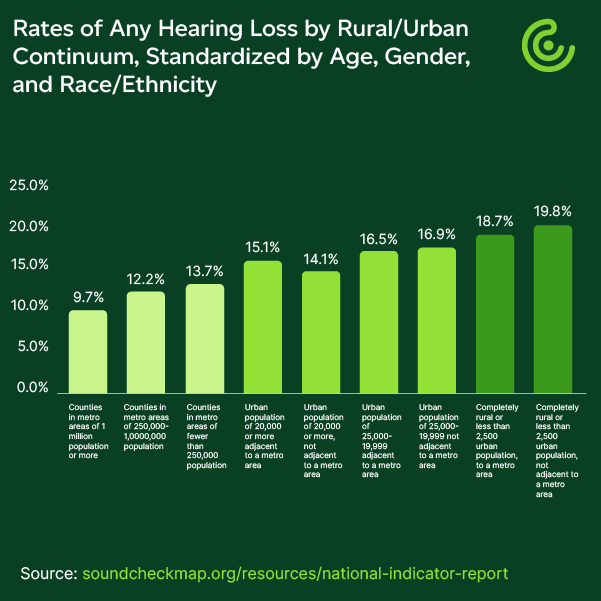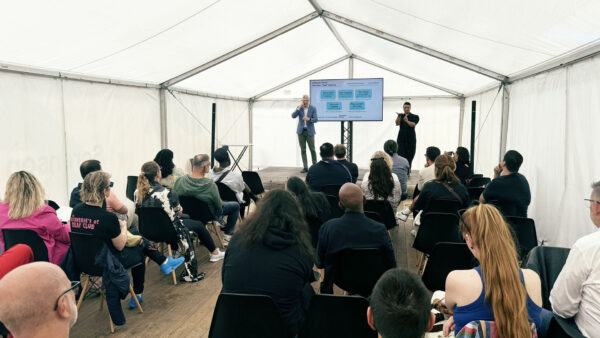Urban vs. Rural Hearing Loss

No Value (acf:field_669fe7fdb55ef)
There are many factors that may contribute to the development of hearing loss. Who knew that where you live might be one of them?
City noise
Some of the first adjectives many people reach for when describing cities are “loud” or “noisy,” and not without good reason. Between frequent construction, noisy public transportation, dense traffic, and a higher concentration of people making all the noises people make, there is a steady din to most major cities.
According to research shared by the National Park Service, background noise levels in cities average around 50 to 60 decibels (dB) — roughly equivalent to moderate rainfall or a normal conversation — but can frequently spike up to around 85 dB near heavy truck traffic, or even around 95 dB near construction sites.
Rural noise
However, rural areas have their fair share of loud noises, too. Rural areas tend to have more jobs involving heavy equipment use than urban areas — like farming, mining, and manufacturing. Similarly, popular means of recreation in the countryside may involve loud noises, such as hunting or riding ATVs.
There are many pieces of equipment you might run into and work with while out in the country that you’d be unlikely to come across inside city limits. Chainsaws (77-120 dB), combines (80-105 dB), grain dryers (80-102 dB), and crop-dusting aircraft (83-116 dB) can all produce noise levels dangerous to human hearing. Even pig squeals (85-115 dB) can reach nearly the volume of a jet engine (125 dB).
Where does most hearing loss occur?
So, where are we seeing more hearing loss? According to a recent study, hearing loss is more common in rural areas than urban ones.
The study looked at county-by-county data and found:
- the most urban counties — metro areas with over 1 million residents — had the lowest rate of hearing loss at 9.7%
- the most rural counties — with fewer than 2,500 residents and not adjacent to a metro area — had the highest rate of hearing loss at 19.8%.
The authors of the study didn’t offer conclusions about the cause of this marked difference in hearing loss rates, though they did offer some speculation. Potential factors include some of the noise sources we’ve already discussed, like hunting or using motorized recreational vehicles, and prolonged exposure to farm and forestry equipment.
Less access to healthcare and poorer overall health in rural areas may also be a factor. Multiple studies have shown that healthcare is harder to access in rural areas. It stands to reason that this larger trend is at least partially responsible for the disparity in hearing health as well.
Related articles
Deaf Community
News
News and updates about Sorenson VRS products and features and the Deaf community
Hearing Health Providers News
Hearing loss news and trends for hearing health professionals
Hard-of-Hearing
News
News and updates about living well with hearing loss and getting the most out of CaptionCall and CaptionCall Mobile

No Value (acf:field_67911dacbb423)
Tips for protecting your ears
Regardless of where you live, there are a few simple habits you can pick up to reduce your chances of losing your hearing.
-
- Wear hearing protection
No matter where you live, proper hearing protection — whether it’s protective earmuffs for heavy farming machines or well-fitted earplugs on a busy inner-city commute — is the best way to slow down hearing loss. The best thing you can do for your ears is invest in some quality ear protection that fits your lifestyle and learn how to use it effectively.
- Wear hearing protection
-
- Take listening breaks
The volume of noise isn’t the only thing that makes it potentially harmful — the duration of exposure matters too. That means that you can reduce your risk of hearing loss by limiting the amount of time you spend around loud sounds. Whether that means switching off power tools, finding a quieter area to enjoy lunch or a water break, or finding a quiet empty conference room to get away from construction noise, listening breaks can make a big difference to your overall hearing health.
- Take listening breaks
-
- Lower the volume on headphones
Some well-fitted, noise-cancelling headphones may help block some sound from a noisy environment. However, if you’re also blasting music to drown out the noise, you might actually be doing more harm than good.
Loud music directly into your ears is very dangerous for your hearing health. When you think about it that way, it makes little sense as a method for preventing ear damage. Typical headphones are not suitable replacements for proper ear protection, and no matter what kind of environment you’re in, turn down the volume on your headphones!
- Lower the volume on headphones

No Value (acf:field_67911d8bbb421)













































